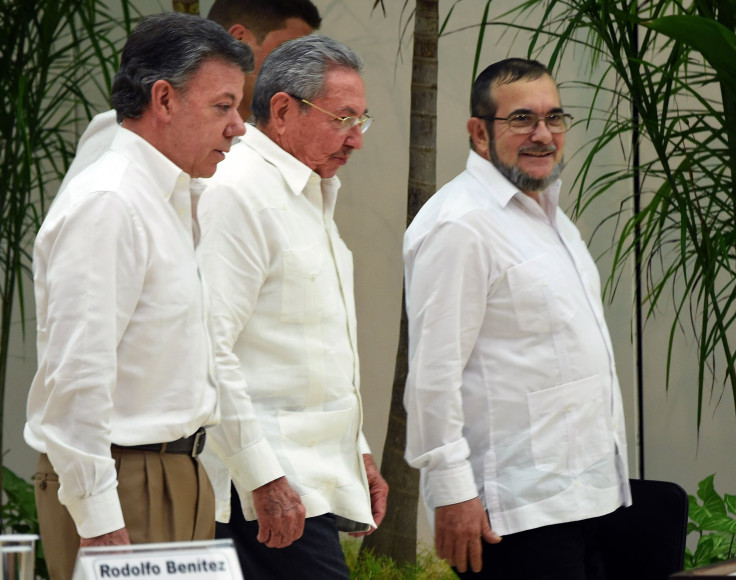Colombia Civil War To End? Rebel Group FARC, President Santos Agree To Peace Deal: Report

Updated as of 9:20 p.m. EDT: Reacting to the news that the longest-running civil war in Latin American history was on the verge of coming to an end, U.S. Secretary of State John Kerry issued a statement Wednesday evening applauding the efforts of the Colombian President and Timoleon Jimenez, the top leader of the guerrilla rebel group Revolutionary Armed Forces of Colombia, or FARC, to reach a peace deal in the South American country.
"We applaud President Santos and his negotiating team for their efforts to reach a just and lasting peace with the FARC," Kerry said in part. "We are hopeful the parties will soon conclude a final agreement to end this terrible war. The Colombian people deserve a just and durable peace, and this will be their victory."
Original story: An end to more than 50 years of armed conflict in Colombia was looking like a realistic possibility after the South American country's president and the leaders of a rebel group there agreed to work to bring peace to a region that has been part of Latin America's lengthiest civil war, according to multiple reports. Colombian President Juan Manuel Santos and high-ranking members of the Revolutionary Armed Forces of Colombia, or FARC, a leftist guerrilla militia, are expected to meet Thursday to iron out the details of how to bring justice to the victims of the conflict and dole out punishment for human rights violations, the Associated Press reported.
"I want to recognize and value the step that the FARC has taken today," Santos said Wednesday in Havana, Cuba, where peace talks between the two sides have been going on for the better part of three years. "We are on different sides, but today we advance in the same direction, in the most noble direction a society can take, which is toward peace."
A landmark peace deal between the two was expected to be solidified and signed within six months, and local news outlet El Espectador reported that the agreement would end the civil war by March 2016. While all the details of the agreement were not immediately available, some of the stipulations included that FARC rebels admit to playing a criminal role in the country and compensate their victims, though it's not entirely clear what exactly that would entail.
An Argentine pope at the White House and a historic handshake btw Colombia and FARC. What a day for Latin America pic.twitter.com/bqMtkmzELA
— Brian Winter (@BrazilBrian) September 23, 2015
Santos sat Wednesday alongside FARC's top leader, Timoleon Jimenez, more popularly known as Timoshenko, and Cuban President Raul Castro when they made the joint announcement. The breakthrough, historic agreement was lauded as a "special peace jurisdiction" by the Cuban foreign ministry, according to the BBC.
FARC, which had already announced a ceasefire over the summer, has been operating in Colombia as a terrorist organization since the '60s, although it has steadily denied any criminal accusations so that its members could avoid jail time. Under the tentative agreement, it was unclear if there would be any chance of imprisoning members of the leftist military organization, but all of the charges specifically against FARC's leadership have been ordered suspended by the Colombia attorney general, according to a tweet by El Espectador.
The deal apparently moved closer to fruition after Pope Francis visited Cuba last week and insisted the two sides come to peaceful terms.
© Copyright IBTimes 2024. All rights reserved.






















